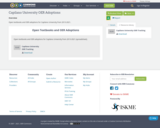
Open textbooks and OER adoptions for Capilano University from 2013-2021.
- Subject:
- Higher Education
- Material Type:
- Teaching/Learning Strategy
- Author:
- Darcye Lovsin
- Date Added:
- 03/31/2021

Open textbooks and OER adoptions for Capilano University from 2013-2021.

With so many freely available resources online, choosing OER can be overwhelming. This checklist contains some suggestions for faculty when choosing resources. The checklist contains items to consider for relevance, accuracy, production quality, accessibility, interactivity, and licensing.This guide is a creation of the BC OEL, a group of BC postsecondary librarians working together to support the use of quality OER. Find out more at https://open.bccampus.ca
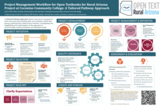
The Comprehensive OER Toolkit has been thoughtfully designed to empower educators and managers with the essential tools and guidance needed to effectively initiate, implement, and manage Open Educational Resources (OER) projects within their educational institutions. These resources have been carefully curated to facilitate a seamless workflow and streamline the processes associated with OER adoption.By offering this diverse array of resources, the Comprehensive OER Toolkit aims to equip educators and managers with a comprehensive suite of materials and templates to effectively manage the entire lifecycle of OER projects, from their inception to evaluation. Whether you are a novice or an experienced OER advocate, these resources can be customized and adapted to meet the specific needs of your institution, ultimately fostering a culture of open education and enhancing access to quality learning materials for all students.
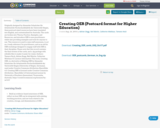
Originally designed by Alexander
Schnücker für Arbeitsstelle Hochschuldidaktik der Universität Siegen, these postcard-sized resources have been translated into English, and contextualised for Australia.
The cards are broken into Theory, Practice, Examples, and Resources, and introduce OER to new practitioners whilst also providing examples and tools for anyone to use.
This resource is used to raise staff awareness, to act as a 'ready reference' for practitioners, and as an aid for OER workshops designed to engage staff with OER in their discipline.
Please note that this record contains the final version of the cards, and a .zip package with editable files to make it easier for remix.
Authors: Tamara Heck, Adrian Stagg, Neil Martin, Catherine Wattiaux
CC Licence Information
This work, Creating OER, is a derivative of Making OER by Alexander Schnücker für Arbeitsstelle Hochschuldidaktik der Universität Siegen [University of Siegen, Germany], used under Creative Commons Attribution-ShareAlike 4.0.
Creating OER is licensed under Creative Commons Attribution-
ShareAlike 4.0 International License by University of Southern
Queensland, Toowoomba, Australia.
https://creativecommons.org/licenses/by-sa/4.0/

This resource provides guidance for school districts when considering OER for adoption as well as currently available full-course openly licensed resources to consider.
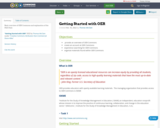
Basic overview of OER Commons and explanation of the PAIU Hub
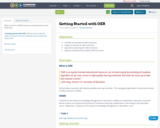
Basic overview of OER Commons and explanation of the PAIU Hub
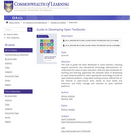
This how to guide has been developed to assist teachers, teaching support personnel and educational technology administrators to: understand the value of open education, OER and open textbooks for teaching and learning; appreciate the potential value of developing an open textbook platform; select appropriate technology to build an open textbook platform, using either existing services offered free on the Internet or open-source tools, based on local needs and resources; and build, manage and maintain an open textbook platforms.
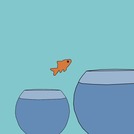
The School Librarian Program at Granite State College is based on the foundational belief that school librarians are essential, integral and transformational leaders. The program focuses on preparing school librarians as catalysts for school change and learning for the digital age. In addition to developing the requisite skill sets and knowledge base needed to perform at top levels, there is a focus on the development of dispositions and attitudes such as initiative, creativity, self-direction, resilience, flexibility and intellectual curiosity which are crucial in assisting learning communities to engage in continuous improvement, innovation and reflective practice. The program emphasizes the convergence of these dispositions, skills, knowledge and understandings in order for candidates to achieve and succeed with a strategic plan for schools to ramp up and redesign school library media programs to provide the requisite, robust environment and intentional opportunities for meaningful student engagement with content, ideas, information and technology.This module is intended to be completed over the course of a 12-week semester and is designed to develop understanding about becoming a more effective school library leader within the evolving contexts of the digital age – especially related to the assessment of leadership dispositions and competencies needed to ramp up and redesign school library programs to provide the robust, flexible environments and intentional opportunities for meaningful student and teacher engagement with OER content, ideas, information and technology. The module addresses five areas of focus — preparation (2 weeks), planning (2 weeks), organizational strategy and change (3 weeks), transformational learning (3 weeks) and reflection/synthesis (2 week).
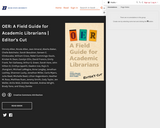
We intend this book to act as a guide writ large for would-be champions of OER, that anyone—called to action by the example set by our chapter authors—might serve as guides themselves. The following chapters tap into the deep experience of practitioners who represent a meaningful cross section of higher education institutions in North America. It is our hope that the examples and discussions presented by our authors will facilitate connections among practitioners, foster the development of best practices for OER adoption and creation, and more importantly, lay a foundation for novel, educational excellence.
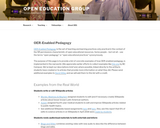
OER-Enabled Pedagogy is the set of teaching and learning practices only practical in the context of the 5R permissions characteristic of open educational resources. Some people – but not all – use the terms “open pedagogy” or “open educational practices” synonymously.
The purpose of this page is to provide a list of concrete examples of how OER-enabled pedagogy is implemented in the real world. We’ve kept our descriptions brief and, where possible, linked directly to the artifacts students have created or to articles that provide more information on what they did.
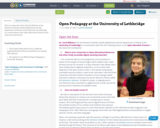
This is an interview with a Faculty Member at the Women & Gender Studies Department and the Department of History at the University of Lethbridge in a conversation on her Open Education Practice in the classroom and beyond
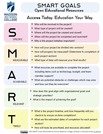
This SMART Goals Worksheet is designed to help educators develop clear, actionable, and achievable objectives using the SMART criteria. SMART goals are Specific, Measurable, Achievable, Relevant, and Time-bound. By applying these criteria, users can create well-defined goals that are easier to track and achieve.

This resource provides guidance for school districts when considering OER for adoption as well as currently available full-course openly licensed resources to consider.